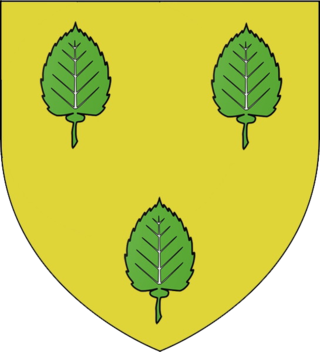Events in the year 1906 in Ireland.
Heaney is a surname of Irish origin. It is an Anglicisation of the Gaelic Ó hEignigh, thought to be based on the Gaelic Eochaidh a personal name meaning "horseman". It was mistakenly thought to derive from Éan, Gaelic for Bird. Versions of it are written in the Annals from the 8th century and has a diverse array of modern derivations and origins.

Ciarán or Ciaran is a traditionally male given name of Irish origin. It means "little dark one" or "little dark-haired one", produced by appending a diminutive suffix to ciar. It is the masculine version of the name Ciara.
O'Connor is a surname of Irish origin. It is derived from the Gaelic Ó Conchobhair. A modern Irish variant spelling is Ó Conchúir.
Jack O'Connor may refer to:

O'Cleary or O'Clery is the surname of a learned Gaelic Irish family. It is the oldest recorded surname in Europe — dating back to 916 CE — and is cognate with cleric and clerk. The O'Clearys are a sept of the Uí Fiachrach dynasty, who ruled the Kingdom of Connacht for nearly two millennia. As Connachta, the O'Cleary's ruled the kingdom of Uí Fiachrach Aidhne for nearly 800 years. They are the descendants of Fiachrae, son of the High King Eochaid Mugmedon, and elder brother of legendary High King Niall of the Nine Hostages. According to legend, they ultimately trace their ancestry back to the mythical Fir Bolg, as well as to Milesius, and consequently to Japheth, son of Noah.
McLachlan, McLachlan or McLaglen is a surname. It is derived from the Irish MacLachlainn, which is in turn a patronymic form of the Gaelic personal name Lachlann. Notable people with the surname include:
Diarmaid is a masculine given name in the Irish language, which has historically been anglicized as Jeremiah or Jeremy, names with which it is etymologically unrelated. The name Dimity might have been used as a feminine English equivalent of the name in Ireland. Earlier forms of the name include Diarmit and Diarmuit. Variations of the name include Diarmait and Diarmuid. Anglicised forms of the name include Dermody, Dermot and Dermod. Mac Diarmata, anglicised McDermott and similar, is the patronymic and surname derived from the personal name. The exact etymology of the name is debated. There is a possibility that the name is derived in part from dí, which means "without"; and either from airmit, which means "injunction", or airmait, which means "envy". The Irish name later spread to Scotland where in Scottish Gaelic the form of the name is Diarmad; Anglicised forms of this name include Diarmid and Dermid.

Kavanagh or Kavanaugh is a surname of Irish origin, Caomhánach in Irish. It is properly Mac Murchadha Caomhánach, but is often now rendered 'Caomhánach' or rarely 'Ó Caomhánaigh'.
Niamh is an Irish feminine given name, anglicised as Neve, Nieve, Neave, Neavh or Neeve.
Michael, Mike, Mick or Micky Burke may refer to:
Séamus is an Irish and Scottish male given name, of Hebrew origin via Latin. It is the Irish equivalent of the name James. The name James is the English New Testament variant for the Hebrew name Jacob. It entered the Irish and Scottish Gaelic languages from the French variation of the late Latin name for Jacob, Iacomus; a dialect variant of Iacobus, from the New Testament Greek Ἰάκωβος, and ultimately from Hebrew word יעקב, i.e. Jacob. Its meaning in Hebrew is "one who supplants" or more literally "one who grabs at the heel". When the Hebrew patriarch Jacob was born, he was grasping his twin brother Esau's heel.
John O'Reilly may refer to:
Brian Howard may refer to:
Liam O'Connor may refer to:
Aidan or Aiden are anglicised versions of the Irish male given name Aodhán. Phonetic variants such as Aiden have become more common. The Irish language female equivalent is Aodhnait.
John O'Donnell may refer to:

Rory is a given name of Gaelic origin. It is an anglicisation of the Irish: Ruairí/Ruaidhrí and Scottish Gaelic: Ruairidh/Ruaraidh and is common to the Irish, Highland Scots and their diasporas. The meaning of the name is "red king", composed of ruadh ("red") and rígh ("king").
This page is based on this
Wikipedia article Text is available under the
CC BY-SA 4.0 license; additional terms may apply.
Images, videos and audio are available under their respective licenses.



